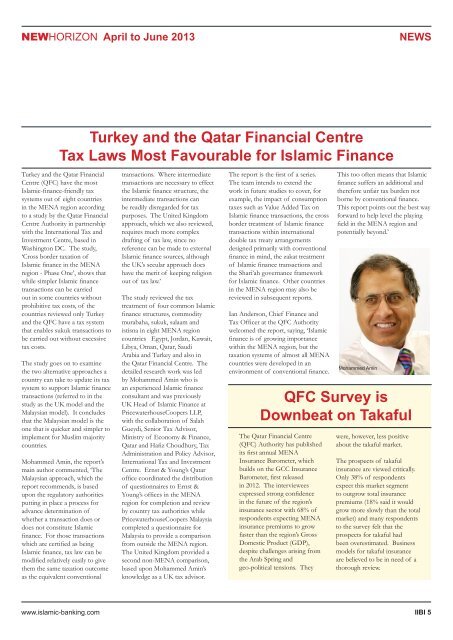NEWHORIZON
NEWHORIZON - Institute of Islamic Banking and Insurance
NEWHORIZON - Institute of Islamic Banking and Insurance
- No tags were found...
You also want an ePaper? Increase the reach of your titles
YUMPU automatically turns print PDFs into web optimized ePapers that Google loves.
<strong>NEWHORIZON</strong> April to June 2013<br />
NEWS<br />
Turkey and the Qatar Financial Centre<br />
Tax Laws Most Favourable for Islamic Finance<br />
Turkey and the Qatar Financial<br />
Centre (QFC) have the most<br />
Islamic-finance-friendly tax<br />
systems out of eight countries<br />
in the MENA region according<br />
to a study by the Qatar Financial<br />
Centre Authority in partnership<br />
with the International Tax and<br />
Investment Centre, based in<br />
Washington DC. The study,<br />
‘Cross border taxation of<br />
Islamic finance in the MENA<br />
region - Phase One’, shows that<br />
while simpler Islamic finance<br />
transactions can be carried<br />
out in some countries without<br />
prohibitive tax costs, of the<br />
countries reviewed only Turkey<br />
and the QFC have a tax system<br />
that enables sukuk transactions to<br />
be carried out without excessive<br />
tax costs.<br />
The study goes on to examine<br />
the two alternative approaches a<br />
country can take to update its tax<br />
system to support Islamic finance<br />
transactions (referred to in the<br />
study as the UK model and the<br />
Malaysian model). It concludes<br />
that the Malaysian model is the<br />
one that is quicker and simpler to<br />
implement for Muslim majority<br />
countries.<br />
Mohammed Amin, the report’s<br />
main author commented, ‘The<br />
Malaysian approach, which the<br />
report recommends, is based<br />
upon the regulatory authorities<br />
putting in place a process for<br />
advance determination of<br />
whether a transaction does or<br />
does not constitute Islamic<br />
finance. For those transactions<br />
which are certified as being<br />
Islamic finance, tax law can be<br />
modified relatively easily to give<br />
them the same taxation outcome<br />
as the equivalent conventional<br />
transactions. Where intermediate<br />
transactions are necessary to effect<br />
the Islamic finance structure, the<br />
intermediate transactions can<br />
be readily disregarded for tax<br />
purposes. The United Kingdom<br />
approach, which we also reviewed,<br />
requires much more complex<br />
drafting of tax law, since no<br />
reference can be made to external<br />
Islamic finance sources, although<br />
the UK’s secular approach does<br />
have the merit of keeping religion<br />
out of tax law.’<br />
The study reviewed the tax<br />
treatment of four common Islamic<br />
finance structures, commodity<br />
murabaha, sukuk, salaam and<br />
istisna in eight MENA region<br />
countries Egypt, Jordan, Kuwait,<br />
Libya, Oman, Qatar, Saudi<br />
Arabia and Turkey and also in<br />
the Qatar Financial Centre. The<br />
detailed research work was led<br />
by Mohammed Amin who is<br />
an experienced Islamic finance<br />
consultant and was previously<br />
UK Head of Islamic Finance at<br />
PricewaterhouseCoopers LLP,<br />
with the collaboration of Salah<br />
Gueydi, Senior Tax Advisor,<br />
Ministry of Economy & Finance,<br />
Qatar and Hafiz Choudhury, Tax<br />
Administration and Policy Advisor,<br />
International Tax and Investment<br />
Centre. Ernst & Young’s Qatar<br />
office coordinated the distribution<br />
of questionnaires to Ernst &<br />
Young’s offices in the MENA<br />
region for completion and review<br />
by country tax authorities while<br />
PricewaterhouseCoopers Malaysia<br />
completed a questionnaire for<br />
Malaysia to provide a comparison<br />
from outside the MENA region.<br />
The United Kingdom provided a<br />
second non-MENA comparison,<br />
based upon Mohammed Amin’s<br />
knowledge as a UK tax advisor.<br />
The report is the first of a series.<br />
The team intends to extend the<br />
work in future studies to cover, for<br />
example, the impact of consumption<br />
taxes such as Value Added Tax on<br />
Islamic finance transactions, the cross<br />
border treatment of Islamic finance<br />
transactions within international<br />
double tax treaty arrangements<br />
designed primarily with conventional<br />
finance in mind, the zakat treatment<br />
of Islamic finance transactions and<br />
the Shari’ah governance framework<br />
for Islamic finance. Other countries<br />
in the MENA region may also be<br />
reviewed in subsequent reports.<br />
Ian Anderson, Chief Finance and<br />
Tax Officer at the QFC Authority<br />
welcomed the report, saying, ‘Islamic<br />
finance is of growing importance<br />
within the MENA region, but the<br />
taxation systems of almost all MENA<br />
countries were developed in an<br />
environment of conventional finance.<br />
This too often means that Islamic<br />
finance suffers an additional and<br />
therefore unfair tax burden not<br />
borne by conventional finance.<br />
This report points out the best way<br />
forward to help level the playing<br />
field in the MENA region and<br />
potentially beyond.’<br />
QFC Survey is<br />
Downbeat on Takaful<br />
The Qatar Financial Centre<br />
(QFC) Authority has published<br />
its first annual MENA<br />
Insurance Barometer, which<br />
builds on the GCC Insurance<br />
Barometer, first released<br />
in 2012. The interviewees<br />
expressed strong confidence<br />
in the future of the region’s<br />
insurance sector with 68% of<br />
respondents expecting MENA<br />
insurance premiums to grow<br />
faster than the region’s Gross<br />
Domestic Product (GDP),<br />
despite challenges arising from<br />
the Arab Spring and<br />
geo-political tensions. They<br />
Mohammed Amin<br />
were, however, less positive<br />
about the takaful market.<br />
The prospects of takaful<br />
insurance are viewed critically.<br />
Only 38% of respondents<br />
expect this market segment<br />
to outgrow total insurance<br />
premiums (18% said it would<br />
grow more slowly than the total<br />
market) and many respondents<br />
to the survey felt that the<br />
prospects for takaful had<br />
been overestimated. Business<br />
models for takaful insurance<br />
are believed to be in need of a<br />
thorough review.<br />
www.islamic-banking.com IIBI 5
















